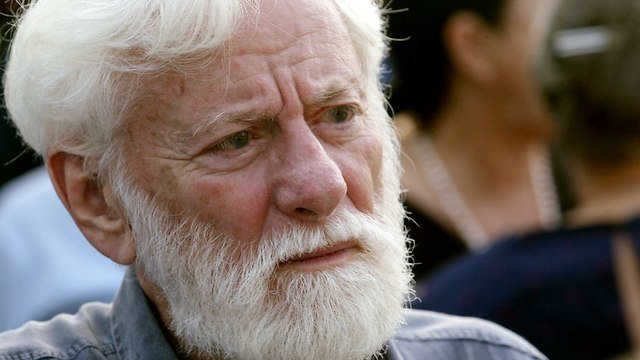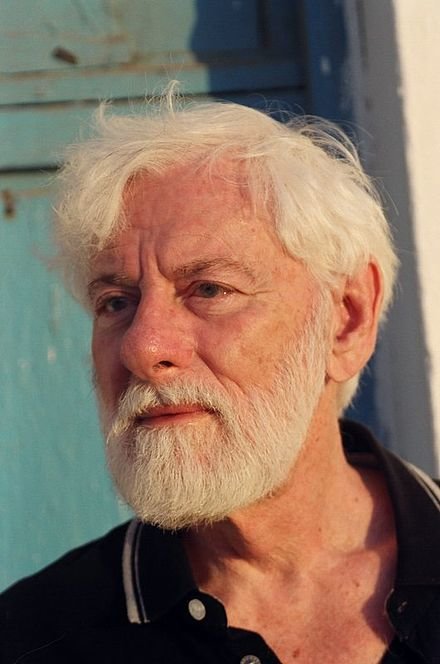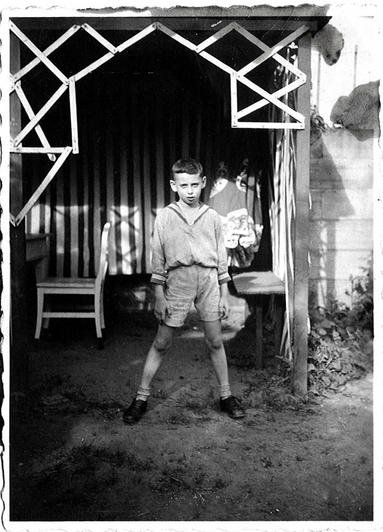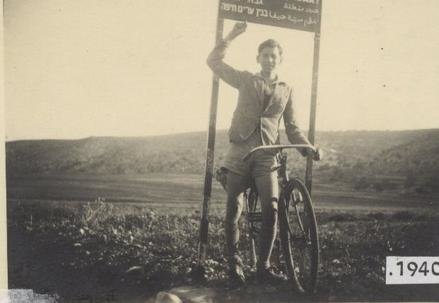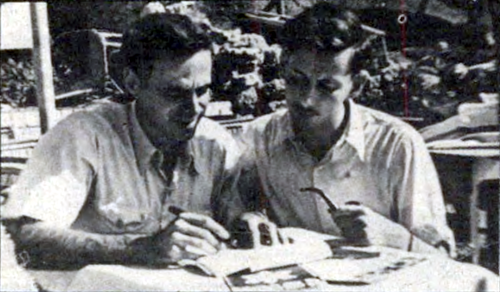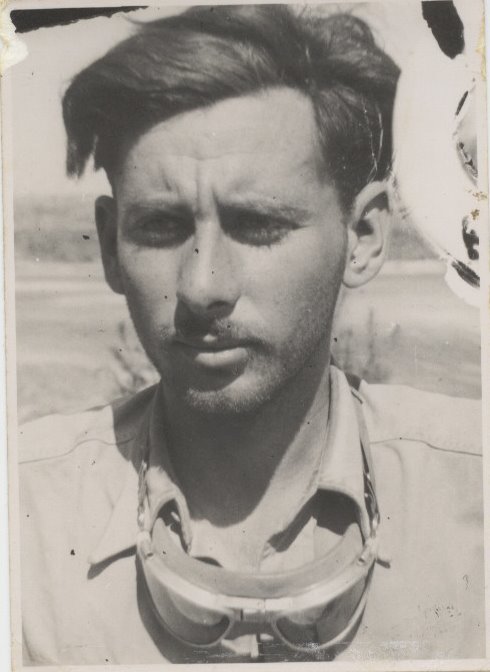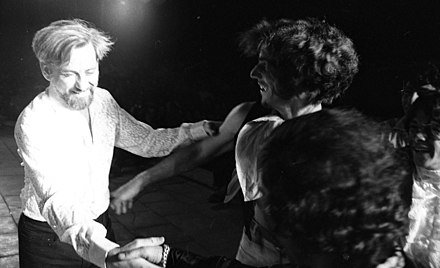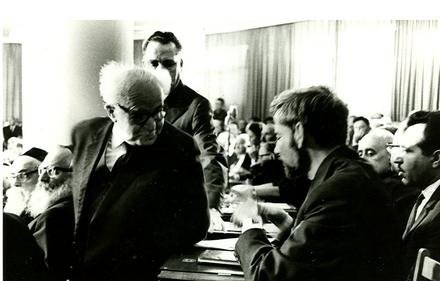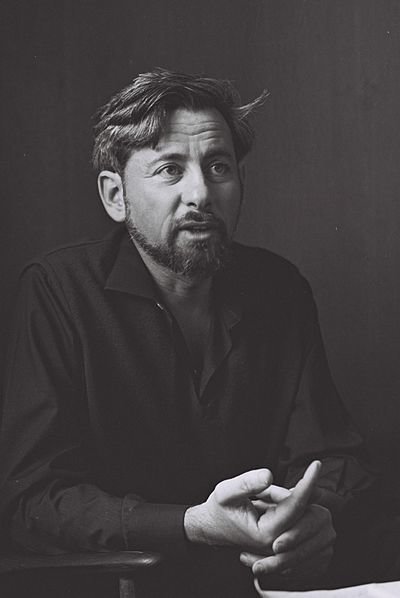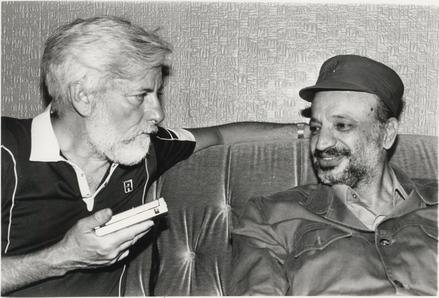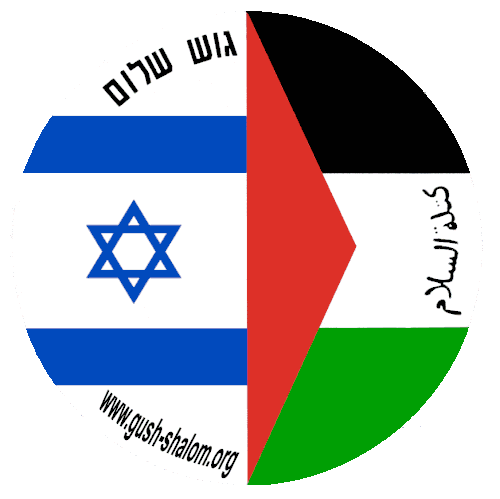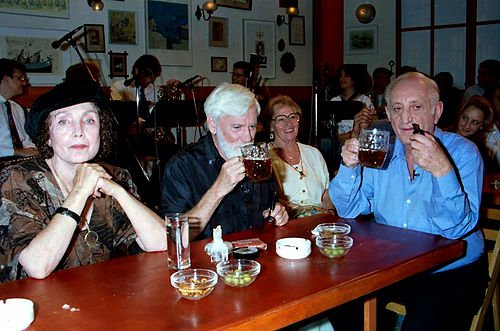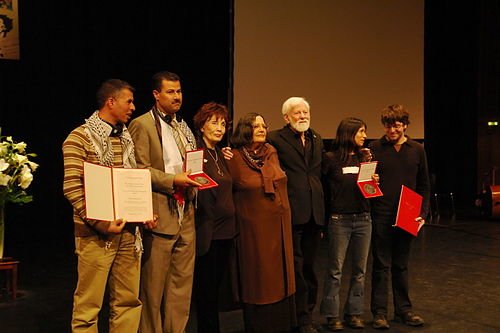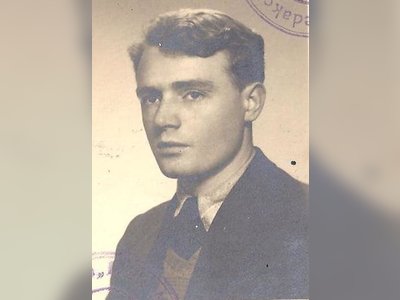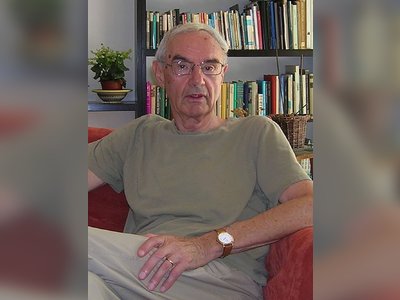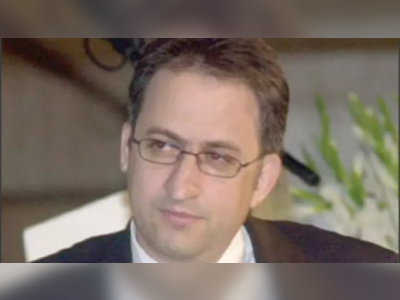מורשת גדולי האומה
בזכותם קיים
beta
Uri Avnery: The Radical Israeli Journalist and Activist
Uri Avnery, born on September 10, 1923, and passing away on August 20, 2018, was a prominent Israeli journalist, editor, writer, Member of the Knesset, and a radical leftist activist.
In 1950, he acquired the weekly magazine "HaOlam HaZeh" (This World) and served as its chief editor for nearly four decades. During his tenure, Avnery transformed the magazine into a widely read and influential publication, establishing its reputation in Israeli journalism. "HaOlam HaZeh" became known for its anti-establishment stance, dedicated to exposing corruption and wrongdoing using sensationalist journalism techniques such as publishing scandals, stories of a sexual nature, gossip, and nude photographs – a unique approach in Israel during those times.
In 1965, Avnery founded and led the "HaOlam HaZeh - Koach Chadash" (This World - New Force) movement. He also served as a Member of the Knesset during the sixth and seventh Knesset sessions. Later, he was involved in the establishment of the Sheli (Freedom) camp and served as a Member of the Knesset during the ninth Knesset. Avnery was also instrumental in founding the "Progressive List for Peace" and the non-parliamentary movement "Gush Shalom."
Throughout his political career, Avnery was an advocate for human rights, fought against religious coercion, opposed racial discrimination, and worked towards equal rights for Arab Israelis. He was a proponent of peace and integration for Israel in the wider Middle East.
Born as Helmut Ostermann in Germany, he emigrated to Israel with his family in November 1933, about ten months after the Nazis came to power. In Israel, his father faced financial hardship and lost his wealth within a year, opening a struggling laundry business in Tel Aviv, where his mother also worked.
Avnery's older brother, Werner, served in the British Army's Commando Unit 51 and was killed in action during World War II in Ethiopia. In his memory, the family adopted the surname "Avnery." Uri Avnery later changed his name to Yossi, in honor of his grandfather, and eventually chose the name Uri.
Due to economic difficulties, Avnery left school at the age of 14 after completing seventh grade at the "Achad Ha'am" boys' school. He began working as a radio technician and later held positions at a law firm, the investigative office of David Tidhar, the Labor Department of the "Association of Industrialists in Eretz-Israel," and the economic-revisionist newspaper "Planius." His education was primarily self-taught through reading books.
At the age of 15, Avnery joined the Irgun (Etzel) organization in the "Z" platoon under the command of Avraham Katz and left the organization in 1941. He later expressed that his participation in the Irgun was a direct response to the hanging of Shlomo Ben-Yosef, one of the Irgun members who threw a grenade at an Arab bus in which women and children were present. The grenade did not explode, and Avnery believed that it was the right thing to join the Irgun at that time.
He served as the secretary for Arie Altman, the head of the New Zionist Organization (Hazit HaTzioni HaChadasha), a breakaway group from the World Zionist Organization. Avnery was a member of the organization's Culture Committee, wrote for the Revisionist Zionist newspaper "Brit HaTzionim HaRevi'iyonim," "HaMashkif," and Jacob Vineshl's bi-weekly Revisionist publication "HaChaverah." He also delivered lectures at the New Zionist Organization's club in Tel Aviv.
Jacob Yitzhaki ("Alex"), a member of the "National Camps," and later a radio technician for the Hebrew Underground Voice ("Kol HaMachteret HaIvrit"), recalled that he and his father attended one of Avnery's lectures during that period. Both were impressed by Yossi Osterman's (Avnery) ability to analyze the international political situation and the place of Jews in the world. Yitzhaki noted that this event left a significant impression on him ever since.
Avnery wrote articles in the early 1940s in the Revisionist bi-weekly "HaChaverah," established by Jacob Vineshl, where it is evident that his perspective at the time leaned towards a fusion of Canaanism with fascism and nationalism. His articles expressed his aspiration to rejuvenate the "Hebrew people" by purging it of all "psychological impediments" and eliminating all "exiles" within it. This elimination would lead to a transformation of the national body and the "glorious resurrection" of the "ancient and young Hebrew race" that would dominate the entire space. In these articles, he argued that it was necessary to create a propaganda that would penetrate various layers of the population in the Land of Israel and that the Nazi propaganda had successfully eliminated the "foreign shells of the bourgeois, culture, and civilization, thought, and rationalism," in order to revive the ancient Germans' natural powers, which contributed "tremendous power to the Nazi glory." He also demanded to implement this among the inhabitants of the Land of Israel to assist them in the "psychological revolution," which he considered an essential stage in the "racial revival of the Hebrew people." This would result in the awakening of the masses, expressed in the loss of individuality among its members and the "complete assimilation into the immense, boiling, and boundless mass," leading to the purification of the Hebrew people from its complications and psychological obstacles.
About a month later, he published another article in "HaChaverah" under the title "Between Judaism and Hebrewism," in which he opposed religious myths that were gaining popularity worldwide. He advocated for ethnic-national myths, similar in every way to the "original beliefs" of these collectivists from ancient times. The adoption of these myths, he argued, would elevate the "moral heroes" and promote the "ancient cult of sacrifice," which would lead to the formation of a nation, a race, and a national leader symbolizing courage and national unity. Avnery argued that even among Jews, there was an awakening of the "great cry, the rebellion of the Hebrew blood" against its religious status quo. He called for the "erasure of the chapter of Judaism from the tablets of the Hebrew people" and the birth of the "Hebrew race."
In 1944, as the "Commissioner of Propaganda" for the central committee of the New Zionist Organization in Israel, Avnery published two issues of an internal ideological journal called "Bamaavak" (In the Struggle). The journal aimed to elucidate the political line of the central committee in Israel, consolidate the movement's ideological unity through free debate among differing opinions, and educate the national activists in all aspects of the struggle and ideological fields.
In 1946, he was involved in creating a group influenced by Canaanism, named "Eretz-Israel HaTzeira" (Young Land of Israel), later known as "Bamaavak" after its publication. In 1947, "Bamaavak" became an independent bi-weekly periodical. This publication had a significant impact and contributed to the ideological debates of the time. Canaanite ideology sought to form a Hebrew nation and Hebrew culture that were independent of any foreign influences. It called for the abandonment of Jewish traditions, customs, and folklore, focusing instead on the revival of the ancient Hebrew identity.
Avnery, along with his comrades in "Bamaavak," wrote essays that sharply criticized the Zionist establishment and mainstream Israeli society. They accused the Zionist leaders of exploiting the Holocaust to advance their own political goals and accused the Israeli government of perpetuating militarism, colonialism, and inequality. They also called for the creation of a new Hebrew culture, based on the pre-Judaic Canaanite heritage and devoid of any religious or nationalist elements.
In 1947, "Bamaavak" published a provocative manifesto titled "The Hebrew Manifesto," which called for the rejection of Jewish identity in favor of a purely Hebrew one. The manifesto declared:
"We hereby dissolve the 'Jewish people.' We declare that a new nation has been born: the Hebrew nation. The Jewish problem has disappeared. It no longer exists... Only a Hebrew people exists."
This manifesto led to significant controversy and backlash, with mainstream Zionist organizations and religious leaders condemning Avnery and his associates.
During the 1948 Arab-Israeli War (known as the War of Independence in Israel and the Nakba among Palestinians), Avnery joined the Israeli army and fought on the front lines. However, his experiences during the war deepened his disillusionment with the government and military establishment.
After the war, Avnery continued his activism and writing. In 1950, he purchased the weekly magazine "HaOlam HaZeh" (This World) and became its editor. Under his leadership, the magazine gained a reputation for investigative journalism, political satire, and muckraking. Avnery used the magazine to expose corruption, challenge the establishment, and advocate for peace and social justice.
In the 1950s and 1960s, Avnery was a vocal critic of Israel's policies towards its Arab citizens, particularly the military government that was imposed on Arab communities inside Israel. He also opposed Israel's occupation of the West Bank and Gaza Strip following the 1967 Six-Day War.
Avnery's activism extended beyond journalism. In 1965, he founded the "HaOlam HaZeh - Koach Chadash" (This World - New Force) movement, a political party that aimed to challenge the dominance of Israel's two main parties, Mapai (later part of the Labor Party) and Herut (which later merged into the Likud). The party advocated for civil rights, social justice, and a more conciliatory approach to the Arab world.
In 1969, Avnery was elected to the Knesset as a member of the HaOlam HaZeh - Koach Chadash faction. He served as a Knesset member until 1979. During his time in the Knesset, Avnery continued to be a vocal advocate for peace and the rights of Palestinians.
In the 1980s, Avnery played a key role in the establishment of the Sheli (Freedom) camp, a political movement that opposed the Israeli government's policies in the occupied territories and called for a negotiated settlement with the Palestinians. Sheli eventually merged with other left-wing parties to form the Progressive List for Peace, which Avnery chaired.
Throughout his life, Avnery was a consistent advocate for a two-state solution to the Israeli-Palestinian conflict, with Israel and a Palestinian state living side by side in peace. He believed that this was the only way to achieve lasting security and justice for both Israelis and Palestinians.
Avnery also founded the non-parliamentary movement "Gush Shalom" (Peace Bloc), which became a prominent voice for peace and human rights in Israel. Gush Shalom organized protests, published articles and reports, and campaigned for an end to the occupation and a just resolution to the Israeli-Palestinian conflict.
In addition to his political and activist work, Avnery was a prolific writer. He authored numerous books, articles, and essays on a wide range of topics, including politics, history, and culture. His writings often challenged conventional wisdom and provoked debate.
Uri Avnery's life and career were marked by a commitment to his principles, even when they put him at odds with the mainstream in Israeli society. He was a tireless advocate for peace, justice, and human rights, and his legacy continues to influence political discourse in Israel and beyond. His fearless journalism and unwavering dedication to his beliefs earned him both admirers and critics, but there is no denying the significant impact he had on Israeli politics and the broader conversation about the Israeli-Palestinian conflict.
Uri Avnery passed away on August 20, 2018, at the age of 94. Despite his death, his ideas and his legacy continue to shape discussions about the future of Israel and the quest for peace in the Middle East. He remains a symbol of principled activism and a reminder of the importance of challenging the status quo in the pursuit of justice and peace.
In 1965, Avnery founded and led the "HaOlam HaZeh - Koach Chadash" (This World - New Force) movement. He also served as a Member of the Knesset during the sixth and seventh Knesset sessions. Later, he was involved in the establishment of the Sheli (Freedom) camp and served as a Member of the Knesset during the ninth Knesset. Avnery was also instrumental in founding the "Progressive List for Peace" and the non-parliamentary movement "Gush Shalom."
Throughout his political career, Avnery was an advocate for human rights, fought against religious coercion, opposed racial discrimination, and worked towards equal rights for Arab Israelis. He was a proponent of peace and integration for Israel in the wider Middle East.
Born as Helmut Ostermann in Germany, he emigrated to Israel with his family in November 1933, about ten months after the Nazis came to power. In Israel, his father faced financial hardship and lost his wealth within a year, opening a struggling laundry business in Tel Aviv, where his mother also worked.
Avnery's older brother, Werner, served in the British Army's Commando Unit 51 and was killed in action during World War II in Ethiopia. In his memory, the family adopted the surname "Avnery." Uri Avnery later changed his name to Yossi, in honor of his grandfather, and eventually chose the name Uri.
Due to economic difficulties, Avnery left school at the age of 14 after completing seventh grade at the "Achad Ha'am" boys' school. He began working as a radio technician and later held positions at a law firm, the investigative office of David Tidhar, the Labor Department of the "Association of Industrialists in Eretz-Israel," and the economic-revisionist newspaper "Planius." His education was primarily self-taught through reading books.
At the age of 15, Avnery joined the Irgun (Etzel) organization in the "Z" platoon under the command of Avraham Katz and left the organization in 1941. He later expressed that his participation in the Irgun was a direct response to the hanging of Shlomo Ben-Yosef, one of the Irgun members who threw a grenade at an Arab bus in which women and children were present. The grenade did not explode, and Avnery believed that it was the right thing to join the Irgun at that time.
He served as the secretary for Arie Altman, the head of the New Zionist Organization (Hazit HaTzioni HaChadasha), a breakaway group from the World Zionist Organization. Avnery was a member of the organization's Culture Committee, wrote for the Revisionist Zionist newspaper "Brit HaTzionim HaRevi'iyonim," "HaMashkif," and Jacob Vineshl's bi-weekly Revisionist publication "HaChaverah." He also delivered lectures at the New Zionist Organization's club in Tel Aviv.
Jacob Yitzhaki ("Alex"), a member of the "National Camps," and later a radio technician for the Hebrew Underground Voice ("Kol HaMachteret HaIvrit"), recalled that he and his father attended one of Avnery's lectures during that period. Both were impressed by Yossi Osterman's (Avnery) ability to analyze the international political situation and the place of Jews in the world. Yitzhaki noted that this event left a significant impression on him ever since.
Avnery wrote articles in the early 1940s in the Revisionist bi-weekly "HaChaverah," established by Jacob Vineshl, where it is evident that his perspective at the time leaned towards a fusion of Canaanism with fascism and nationalism. His articles expressed his aspiration to rejuvenate the "Hebrew people" by purging it of all "psychological impediments" and eliminating all "exiles" within it. This elimination would lead to a transformation of the national body and the "glorious resurrection" of the "ancient and young Hebrew race" that would dominate the entire space. In these articles, he argued that it was necessary to create a propaganda that would penetrate various layers of the population in the Land of Israel and that the Nazi propaganda had successfully eliminated the "foreign shells of the bourgeois, culture, and civilization, thought, and rationalism," in order to revive the ancient Germans' natural powers, which contributed "tremendous power to the Nazi glory." He also demanded to implement this among the inhabitants of the Land of Israel to assist them in the "psychological revolution," which he considered an essential stage in the "racial revival of the Hebrew people." This would result in the awakening of the masses, expressed in the loss of individuality among its members and the "complete assimilation into the immense, boiling, and boundless mass," leading to the purification of the Hebrew people from its complications and psychological obstacles.
About a month later, he published another article in "HaChaverah" under the title "Between Judaism and Hebrewism," in which he opposed religious myths that were gaining popularity worldwide. He advocated for ethnic-national myths, similar in every way to the "original beliefs" of these collectivists from ancient times. The adoption of these myths, he argued, would elevate the "moral heroes" and promote the "ancient cult of sacrifice," which would lead to the formation of a nation, a race, and a national leader symbolizing courage and national unity. Avnery argued that even among Jews, there was an awakening of the "great cry, the rebellion of the Hebrew blood" against its religious status quo. He called for the "erasure of the chapter of Judaism from the tablets of the Hebrew people" and the birth of the "Hebrew race."
In 1944, as the "Commissioner of Propaganda" for the central committee of the New Zionist Organization in Israel, Avnery published two issues of an internal ideological journal called "Bamaavak" (In the Struggle). The journal aimed to elucidate the political line of the central committee in Israel, consolidate the movement's ideological unity through free debate among differing opinions, and educate the national activists in all aspects of the struggle and ideological fields.
In 1946, he was involved in creating a group influenced by Canaanism, named "Eretz-Israel HaTzeira" (Young Land of Israel), later known as "Bamaavak" after its publication. In 1947, "Bamaavak" became an independent bi-weekly periodical. This publication had a significant impact and contributed to the ideological debates of the time. Canaanite ideology sought to form a Hebrew nation and Hebrew culture that were independent of any foreign influences. It called for the abandonment of Jewish traditions, customs, and folklore, focusing instead on the revival of the ancient Hebrew identity.
Avnery, along with his comrades in "Bamaavak," wrote essays that sharply criticized the Zionist establishment and mainstream Israeli society. They accused the Zionist leaders of exploiting the Holocaust to advance their own political goals and accused the Israeli government of perpetuating militarism, colonialism, and inequality. They also called for the creation of a new Hebrew culture, based on the pre-Judaic Canaanite heritage and devoid of any religious or nationalist elements.
In 1947, "Bamaavak" published a provocative manifesto titled "The Hebrew Manifesto," which called for the rejection of Jewish identity in favor of a purely Hebrew one. The manifesto declared:
"We hereby dissolve the 'Jewish people.' We declare that a new nation has been born: the Hebrew nation. The Jewish problem has disappeared. It no longer exists... Only a Hebrew people exists."
This manifesto led to significant controversy and backlash, with mainstream Zionist organizations and religious leaders condemning Avnery and his associates.
During the 1948 Arab-Israeli War (known as the War of Independence in Israel and the Nakba among Palestinians), Avnery joined the Israeli army and fought on the front lines. However, his experiences during the war deepened his disillusionment with the government and military establishment.
After the war, Avnery continued his activism and writing. In 1950, he purchased the weekly magazine "HaOlam HaZeh" (This World) and became its editor. Under his leadership, the magazine gained a reputation for investigative journalism, political satire, and muckraking. Avnery used the magazine to expose corruption, challenge the establishment, and advocate for peace and social justice.
In the 1950s and 1960s, Avnery was a vocal critic of Israel's policies towards its Arab citizens, particularly the military government that was imposed on Arab communities inside Israel. He also opposed Israel's occupation of the West Bank and Gaza Strip following the 1967 Six-Day War.
Avnery's activism extended beyond journalism. In 1965, he founded the "HaOlam HaZeh - Koach Chadash" (This World - New Force) movement, a political party that aimed to challenge the dominance of Israel's two main parties, Mapai (later part of the Labor Party) and Herut (which later merged into the Likud). The party advocated for civil rights, social justice, and a more conciliatory approach to the Arab world.
In 1969, Avnery was elected to the Knesset as a member of the HaOlam HaZeh - Koach Chadash faction. He served as a Knesset member until 1979. During his time in the Knesset, Avnery continued to be a vocal advocate for peace and the rights of Palestinians.
In the 1980s, Avnery played a key role in the establishment of the Sheli (Freedom) camp, a political movement that opposed the Israeli government's policies in the occupied territories and called for a negotiated settlement with the Palestinians. Sheli eventually merged with other left-wing parties to form the Progressive List for Peace, which Avnery chaired.
Throughout his life, Avnery was a consistent advocate for a two-state solution to the Israeli-Palestinian conflict, with Israel and a Palestinian state living side by side in peace. He believed that this was the only way to achieve lasting security and justice for both Israelis and Palestinians.
Avnery also founded the non-parliamentary movement "Gush Shalom" (Peace Bloc), which became a prominent voice for peace and human rights in Israel. Gush Shalom organized protests, published articles and reports, and campaigned for an end to the occupation and a just resolution to the Israeli-Palestinian conflict.
In addition to his political and activist work, Avnery was a prolific writer. He authored numerous books, articles, and essays on a wide range of topics, including politics, history, and culture. His writings often challenged conventional wisdom and provoked debate.
Uri Avnery's life and career were marked by a commitment to his principles, even when they put him at odds with the mainstream in Israeli society. He was a tireless advocate for peace, justice, and human rights, and his legacy continues to influence political discourse in Israel and beyond. His fearless journalism and unwavering dedication to his beliefs earned him both admirers and critics, but there is no denying the significant impact he had on Israeli politics and the broader conversation about the Israeli-Palestinian conflict.
Uri Avnery passed away on August 20, 2018, at the age of 94. Despite his death, his ideas and his legacy continue to shape discussions about the future of Israel and the quest for peace in the Middle East. He remains a symbol of principled activism and a reminder of the importance of challenging the status quo in the pursuit of justice and peace.
- אורי אבנרי – ויקיפדיהhe.wikipedia.org
